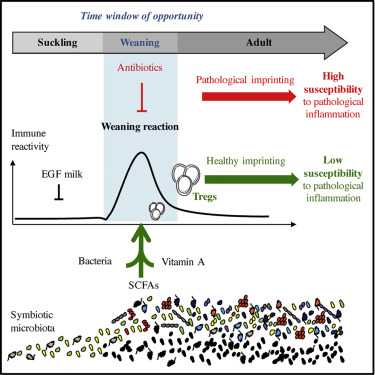Immunity ( IF 25.5 ) Pub Date : 2019-03-19 , DOI: 10.1016/j.immuni.2019.02.014 Ziad Al Nabhani , Sophie Dulauroy , Rute Marques , Clara Cousu , Shahed Al Bounny , François Déjardin , Tim Sparwasser , Marion Bérard , Nadine Cerf-Bensussan , Gérard Eberl

|
Microbes colonize all body surfaces at birth and participate in the development of the immune system. In newborn mammals, the intestinal microbiota is first shaped by the dietary and immunological components of milk and then changes upon the introduction of solid food during weaning. Here, we explored the reactivity of the mouse intestinal immune system during the first weeks after birth and into adulthood. At weaning, the intestinal microbiota induced a vigorous immune response—a “weaning reaction”—that was programmed in time. Inhibition of the weaning reaction led to pathological imprinting and increased susceptibility to colitis, allergic inflammation, and cancer later in life. Prevention of this pathological imprinting was associated with the generation of RORγt+ regulatory T cells, which required bacterial and dietary metabolites—short-chain fatty acids and retinoic acid. Thus, the weaning reaction to microbiota is required for immune ontogeny, the perturbation of which leads to increased susceptibility to immunopathologies later in life.
中文翻译:

成年人对免疫病理学的抵抗需要对微生物群的断奶反应
微生物在出生时会定植于所有体表,并参与免疫系统的发育。在新生的哺乳动物中,肠道微生物群首先会受到牛奶的饮食和免疫成分的影响,然后在断奶期间引入固体食物后发生变化。在这里,我们探讨了出生后最初几周和成年后小鼠肠道免疫系统的反应性。断奶时,肠道菌群会引发强烈的免疫反应,即“断奶反应”,该反应会及时进行。断奶反应的抑制导致病理印记,并在以后的生活中增加了对结肠炎,过敏性炎症和癌症的敏感性。防止这种病理烙印与RORγt +的产生有关调节性T细胞,需要细菌和饮食中的代谢物-短链脂肪酸和视黄酸。因此,免疫个体发育需要对微生物群的断奶反应,其干扰导致生命后期对免疫病理学的敏感性增加。











































 京公网安备 11010802027423号
京公网安备 11010802027423号